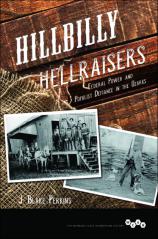Hillbilly Hellraisers: Federal Power and Populist Defiance in the Ozarks
Review
Hillbilly Hellraisers: Federal Power and Populist Defiance in the Ozarks
The Ozarks region of Arkansas has been bowdlerized as a haven for embattled moonshiners who would shoot to kill in order to guard their stills and preserve their isolation. This reputation for ultra-conservative values and a disdainful view of government assistance as ”interference” within the region persists to the present day. But is it accurate? Historian and author J. Blake Perkins, a native of the Ozarks, undertakes to uncover the facts about the Arkansas backcountry and its people in HILLBILLY HELLRAISERS, the latest volume in the University of Illinois Press series, The Working Class in American History.
It’s true that illegal whiskey was manufactured in the Ozark mountains. A skill brought to America by tough, individualistic settlers, moonshining had several purposes. One was to have a cheap source of alcoholic beverages for personal consumption, but that purpose was far secondary to the need for hard cash in an area where steep hills and thin soil made self-sufficiency difficult, even impossible. The third reason was obvious: to avoid government taxation. Perkins vibrantly details the skirmishes, and worse, that characterized the ongoing battle between the whiskey makers and whiskey taxers.
"Perkins has painstakingly researched the complex issues that make up what appears to be a deep strain of conservatism among Ozark denizens."
Another bone of contention arose in the early 1900s when the USDA decreed that all cattle had to be dipped to eradicate ticks. The more prosperous farmers were willing participants, but small farmers whose small herds provided a major source of family income felt it was an unnecessary nuisance, and greatly resented being forced to dip or be fined. Yet the Arkansas farmers whose aggravation was keenest were also those who would have appreciated better service from government agencies that seemed to favor the communities that were already better off. The poverty of the Arkansas Ozarks was made more visible during the 1960s when, as part of the War on Poverty, idealistic volunteers with VISTA, the homeland version of the Peace Corps, were sent there to help improve local conditions.
Perkins has painstakingly researched the complex issues that make up what appears to be a deep strain of conservatism among Ozark denizens. He notes that large federal projects such as hydroelectric dams built in the 1930s and ’40s were beneficial to communities clustered around what would become large lakes attracting out-of-state tourists, while the dam’s construction left poor farmers bereft of once-viable farmland and often badly compensated for their loss. Again, these victims of progress would have gladly welcomed progress had it not seemed generally to find its way into the already better-off, more politically savvy Arkansas enclaves, its profits lining the pockets of the powerful. So suspicion of government programs spread.
Perkins admits that it is difficult to lay back every layer of history to get at the truth of populism in the Arkansas backwoods. But despite this challenge to the historian, he defines the dynamics eloquently: “In reality, most rural working folks in the Ozarks longed for a strong, well-regulated, egalitarian republic to arise, but they detested how…only the well-to-do seemed able to employ the power of the American state and, in their minds, use that power at the expense of hard-working common folks like themselves.”
Reviewed by Barbara Bamberger Scott on October 20, 2017
Hillbilly Hellraisers: Federal Power and Populist Defiance in the Ozarks
- Publication Date: September 11, 2017
- Genres: History, Nonfiction, Sociology
- Paperback: 296 pages
- Publisher: University of Illinois Press
- ISBN-10: 0252082893
- ISBN-13: 9780252082894



